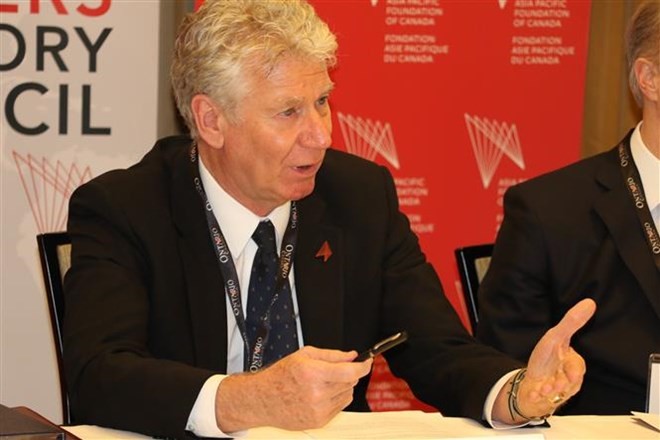
According to Beck, CP TPP is really important to Canada, as it gives the country unlimited access to the Japanese market and other potential markets such as Vietnam and Singapore, with which Canada is yet to have a bilateral free trade agreement.
He said the deal will bring Canada certain advantages in the Vietnamese market, and through Vietnam, helps it to enter the ASEAN.
According to Beck, Canadian people and businesses have come to realise that Vietnam is a potential market thanks to publicity campaigns about the CP TPP. He expressed his belief that after two or three years of enforcement, the CP TPP will help further bilateral cooperation in fields of importance to both countries.
Having visited Vietnam several times to push the implementation of the Women’s Initiative for Startups and Entrepreneurship (WISE) sponsored by the Canadian Consulate General in Vietnam and APF, the expert has his opinion on fields with great potential for bilateral cooperation after the CP TPP officially takes effect.
He said Vietnam will be able to increase the export of seafood and other goods to Canada, and technology and service are also promising fields.
The Canadian side hopes that with the official signing of CP TPP, and considering the large Vietnamese community and increasing numbers of Vietnamese students in Canada, more opportunities for bilateral affiliation will be opened up based on the cultural and education bridges, Beck said.
The Comprehensive and Progressive Agreement for Trans-Pacific Partnership (CP TPP) was officially inked at a ceremony chaired by Chilean President Micelle Bachelet in Chile on March 8.
Trade ministers of 11 countries participating in the trade pact, namely Australia, Brunei, Canada, Malaysia, Mexico, Japan, New Zealand, Peru, Singapore and Vietnam, attended the event.
The ambitious deal came after the US pulled out the Trans-Pacific Partnership (TPP) agreement last year. It sets high criteria in numerous fields, including labour, the environment, intellectual property, digital economy and cyber security.
The pact will create one of the world’s largest free trade blocs with a combined market of 499 million people and GDP of around 10,100 billion USD, accounting for 13.5 percent of the global GDP.
He said the deal will bring Canada certain advantages in the Vietnamese market, and through Vietnam, helps it to enter the ASEAN.
According to Beck, Canadian people and businesses have come to realise that Vietnam is a potential market thanks to publicity campaigns about the CP TPP. He expressed his belief that after two or three years of enforcement, the CP TPP will help further bilateral cooperation in fields of importance to both countries.
Having visited Vietnam several times to push the implementation of the Women’s Initiative for Startups and Entrepreneurship (WISE) sponsored by the Canadian Consulate General in Vietnam and APF, the expert has his opinion on fields with great potential for bilateral cooperation after the CP TPP officially takes effect.
He said Vietnam will be able to increase the export of seafood and other goods to Canada, and technology and service are also promising fields.
The Canadian side hopes that with the official signing of CP TPP, and considering the large Vietnamese community and increasing numbers of Vietnamese students in Canada, more opportunities for bilateral affiliation will be opened up based on the cultural and education bridges, Beck said.
The Comprehensive and Progressive Agreement for Trans-Pacific Partnership (CP TPP) was officially inked at a ceremony chaired by Chilean President Micelle Bachelet in Chile on March 8.
Trade ministers of 11 countries participating in the trade pact, namely Australia, Brunei, Canada, Malaysia, Mexico, Japan, New Zealand, Peru, Singapore and Vietnam, attended the event.
The ambitious deal came after the US pulled out the Trans-Pacific Partnership (TPP) agreement last year. It sets high criteria in numerous fields, including labour, the environment, intellectual property, digital economy and cyber security.
The pact will create one of the world’s largest free trade blocs with a combined market of 499 million people and GDP of around 10,100 billion USD, accounting for 13.5 percent of the global GDP.
























